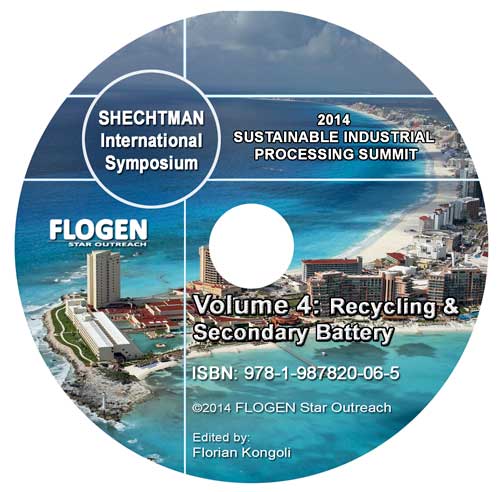2014-Sustainable Industrial Processing Summit
SIPS 2014 Volume 3: Non-ferrous & Iron_Steel
| Editors: | Kongoli F |
| Publisher: | Flogen Star OUTREACH |
| Publication Year: | 2014 |
| Pages: | 522 pages |
| ISBN: | 978-1-987820-05-8 |
| ISSN: | 2291-1227 (Metals and Materials Processing in a Clean Environment Series) |

CD shopping page
Molten salts: from the theory to industrial processes
Patrick Masset1;1FRAUNHOFER UMSICHT, Sulzbach-Rosenberg, Germany (Deutschland);
Type of Paper: Plenary
Id Paper: 228
Topic: 3
Abstract:
Molten salts are liquids which exhibit outstanding physical-chemical properties mainly due to their ionic character. They have attracted a considerable theoretical as well as industrial interest for their unique chemistry and as non-aqueous and aprotic media, respectively. From a theoretical point of view, the uniqueness of this chemistry is symbolized by the development of the oxo-acidity/basicity concept, the theory of F-centers. Recently, the increase of computational capabilities allows to investigate the local structure of molten salts using quantum theories to derive thermodynamic quantities (e.g. energy of solvation).
Depending on their composition, molten salts' melting temperatures range between 100°C for nitrate-based molten salts and up to 1000°C for fluoride-based molten salts. The combination of suitable cations and anions gives the possibility to select mixtures with a specific melting temperature range to enhance certain specific physical-chemical properties. However, no systematic and clear trends between molten salts' composition and their physical-chemical properties have been observed.
Currently, molten salts are used in several industrial processes and/or indirectly involved in sectors such energy, transport, chemical industry. The main applications where molten salts are used are:
- power generation: molten carbonate fuel cells (MCFC), thermal batteries
- electrolytic processes for metal production: aluminum, sodium
- energy transport/storage: solar system, phase change material (PCMs)
- reprocessing: nuclear spent fuels (pyrochemistry), electronic scraps
- coating production: electrodeposition of reactive metals
This presentation provides an overview about the theoretical developments around the molten salt chemistry, illustrated by some industrial applications of well-developed industrial processes. As outlook, the comparison between the main properties of molten salts and ionic liquids will be discussed. From the experience gained along the past decays, relevant information may be analyzed to understand their similitudes/differences for further developments.